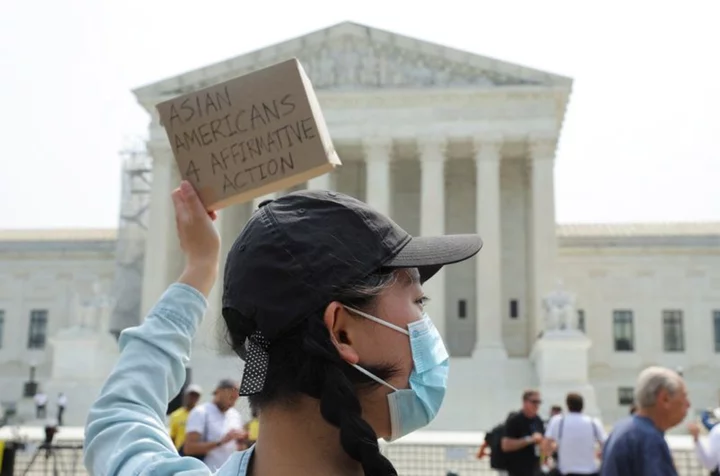By Daniel Wiessner
The U.S. Supreme Court ruling striking down race-conscious policies in college admissions includes some warnings to companies about the legal limits of workforce diversity efforts and is likely to fuel challenges to them, experts said.
Thursday’s ruling has no direct impact on employers because it does not involve workplace bias laws. But in finding that Harvard University and the University of North Carolina unlawfully considered race as a factor in the admissions process, the court may have laid the groundwork for future challenges to corporate diversity initiatives.
Chief Justice John Roberts wrote for the court that a student “must be treated based on his or her experiences as an individual — not on the basis of race.”
In a concurring opinion, Justice Neil Gorsuch noted that the federal law banning race bias in federally-funded programs, including higher education, is "essentially identical" to the law prohibiting workplace discrimination.
The court may be signaling that it would apply the same standard to companies' diversity, equity and inclusion policies, which have been criticized as creating preferences based on race or sex, lawyers and other experts said.
“It’s a helpful reminder that no employment program seeking a racial balance for its own sake can comply with our laws,” said Dan Morenoff, executive director of the American Civil Rights Project, which has mounted legal challenges to corporate policies favoring specific races or genders.
Companies have had policies aimed at diversifying their workforce for decades. But many began looking more closely at the issue beginning in 2020, in the wake of the national reckoning on race spurred by the death of George Floyd and other Black people at the hands of police.
Proponents of corporate diversity initiatives say that along with creating more equity, they attract better talent and can be good for business when they have support among a company's customer base.
For nearly 60 years, federal law has prohibited employers from basing decisions on workers' race, sex, or other protected characteristics. Reverse discrimination lawsuits are common, but there is little court precedent on the legality of whole diversity programs.
The Supreme Court in a 1979 ruling upheld a chemical company's policy that at least half of its trainees for skilled craft positions be Black. The court said the policy was lawful because it was temporary and was designed to remedy past discrimination by the company, but did not consider whether a broader affirmative action policy would violate the law.
'WAKE-UP CALL'
Thursday's Supreme Court decision should spur companies to review their diversity policies and ensure they are not violating the law in the name of vague equity goals, according to Andrea Lucas, a commissioner on the five-member U.S. Equal Employment Opportunity Commission, which enforces federal anti-bias laws.
"The court’s decision should be a wake-up call to employers," said Lucas, who was appointed by Republican former President Donald Trump. The commission currently has a Democratic majority.
By calling out specific admissions policies, such as giving "pluses" to minority students, the court's decision is likely to embolden critics who claim workforce diversity programs similarly give unfair advantages to certain groups.
Roberts, for example, wrote that "in a process where applicants compete for a limited pool of spots, a tip for one race necessarily works as a penalty against other races.”
That could mean a spike in bias lawsuits by white and male workers and challenges to a decades-old requirement that federal contractors adopt policies ensuring equal employment opportunities.
Last year, Pfizer Inc won the dismissal of a lawsuit by a group of medical professionals alleging a fellowship program established by the drugmaker discriminated against white and Asian-American applicants. The plaintiffs are appealing that decision, which involved technical issues and not the merits of the claims.
The Pfizer case was brought by Do No Harm, a conservative activist group that has challenged several diversity programs in healthcare. Conservative lawyer Edward Blum, who engineered the college admissions cases decided on Thursday, is on the group's board of directors.
A representative of Do No Harm did not immediately have comment on Friday. Blum declined to comment.
Lawyers who represent companies said that most employers' diversity and inclusion policies are aimed at creating larger and more diverse pools of candidates rather than setting numerical goals like the admissions policies at issue in the Supreme Court cases.
Those broad policies are likely insulated from legal challenges, according to Doug Brayley, a Boston-based partner at law firm Ropes & Gray. But he and other lawyers said that policies more closely mirroring college admission standards, such as those designed to reserve a set percentage of leadership positions for women or minorities, could be more vulnerable.
“The more strict and more rigid the policy, the more likely it will be challenged,” Brayley said.
(Reporting by Daniel Wiessner in Albany, New York, Editing by Alexia Garamfalvi and Alistair Bell)

